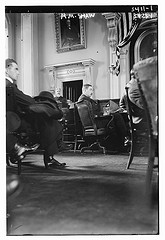Your Constitutional Right to Counsel At a Grand Jury in Pennsylvania
 In Pennsylvania, there is an investigating grand jury system as opposed to indicting grand jury system. Indicting grand juries were abolished in the early 1990s and Pennsylvania now maintains a procedure where a person can be “held” for court following a preliminary hearing before a lower court judge (Municipal Court judge in Philadelphia or District Court judge outside of Philadelphia). At a preliminary hearing, the judge will decide if enough evidence exists for the case to proceed to trial. I have written previous articles on preliminary hearings and I invite you to read them. You should also visit my video page to find information about this topic. Pennsylvania is unique with the preliminary hearing procedure and most states, including New Jersey, employ an indicting grand jury system.
In Pennsylvania, there is an investigating grand jury system as opposed to indicting grand jury system. Indicting grand juries were abolished in the early 1990s and Pennsylvania now maintains a procedure where a person can be “held” for court following a preliminary hearing before a lower court judge (Municipal Court judge in Philadelphia or District Court judge outside of Philadelphia). At a preliminary hearing, the judge will decide if enough evidence exists for the case to proceed to trial. I have written previous articles on preliminary hearings and I invite you to read them. You should also visit my video page to find information about this topic. Pennsylvania is unique with the preliminary hearing procedure and most states, including New Jersey, employ an indicting grand jury system.
While most cases proceed through the preliminary hearing procedure in Pennsylvania, there are some that go to trial following a grand jury proceeding. These are usually cases with the District Attorney has made a request to a court (Motion) requesting that an investigating grand jury be assembled to hear the facts and make a recommendation as to whether a person’s case should proceed to trial. These are usually cases involving witness intimidation or cases where a preliminary hearing would be difficult (large number of defendants). If you would like to learn more about the composition of grand juries, read my previous article on it.
Investigating grand juries, unlike an indicting grand jury, make a formal recommendation known as a “presentment” which a supervising judge can accept or reject. In most situations, however, the supervising judge will accept the presentment and an accused individual’s case will proceed to trial. While there is no constitutional right to representation at a grand jury, witnesses subpoenaed are entitled to counsel under Pennsylvania’s investigating Grand Jury Act and the Constitution. If a person can’t afford counsel the court may appoint the counsel.
Attorneys are allowed to be present in the grand jury room during questioning and advise a witness. An attorney, however, can’t make objections, arguments, or address the grand jury or the prosecutor (district attorney). While a witness to a grand jury does have the right to not answer a question based on their Fifth Amendment Right to self-incrimination, this person still has to appear before a grand jury and doesn’t have a right to remain silent. While a person has a Fifth Amendment Right against self-incrimination a Court can hold someone in contempt where that belief isn’t legitimate. Refusing to answer a question and not recalling events, however, are two different situations. If a person can’t recall, they will not be held in contempt.
In some situations the District Attorney may ask a judge to provide a witness with immunity. If the District Attorney makes this request, the judge must order it if 1) the testimony from the witness is necessary to “the public interest” and 2) the witness has refused to testify on the basis of self-incrimination. A grant of immunity supersedes a person’s constitutional right against self-incrimination and the witness may not refuse to testify based on the fear of self-incrimination under the 5th Amendment.
It is important to understand, however, that a witness who testifies with a grant of immunity may still be prosecuted if this person provides false information or perjures himself. In addition to these prosecutions, the District Attorney can still prosecute a person who has been granted immunity if the prosecution discovers evidence which is independent from the compelled testimony. If a person still refuses to testify even with a grant of immunity, they could be held in contempt of court, fined $1,000.00, and imprisoned up to one year or both. If you have questions about criminal procedure and criminal charges in Pennsylvania, visit my free download section on the website.
